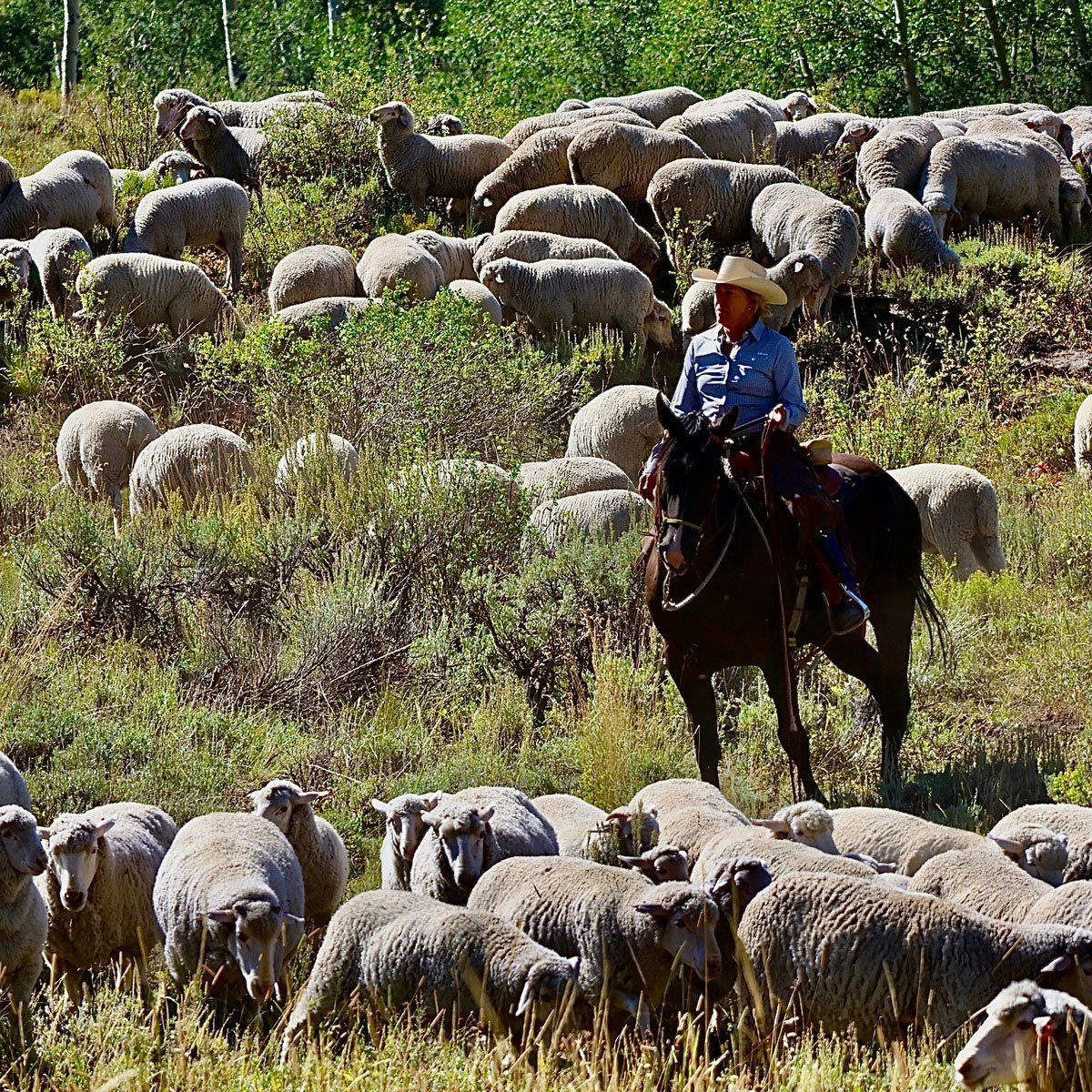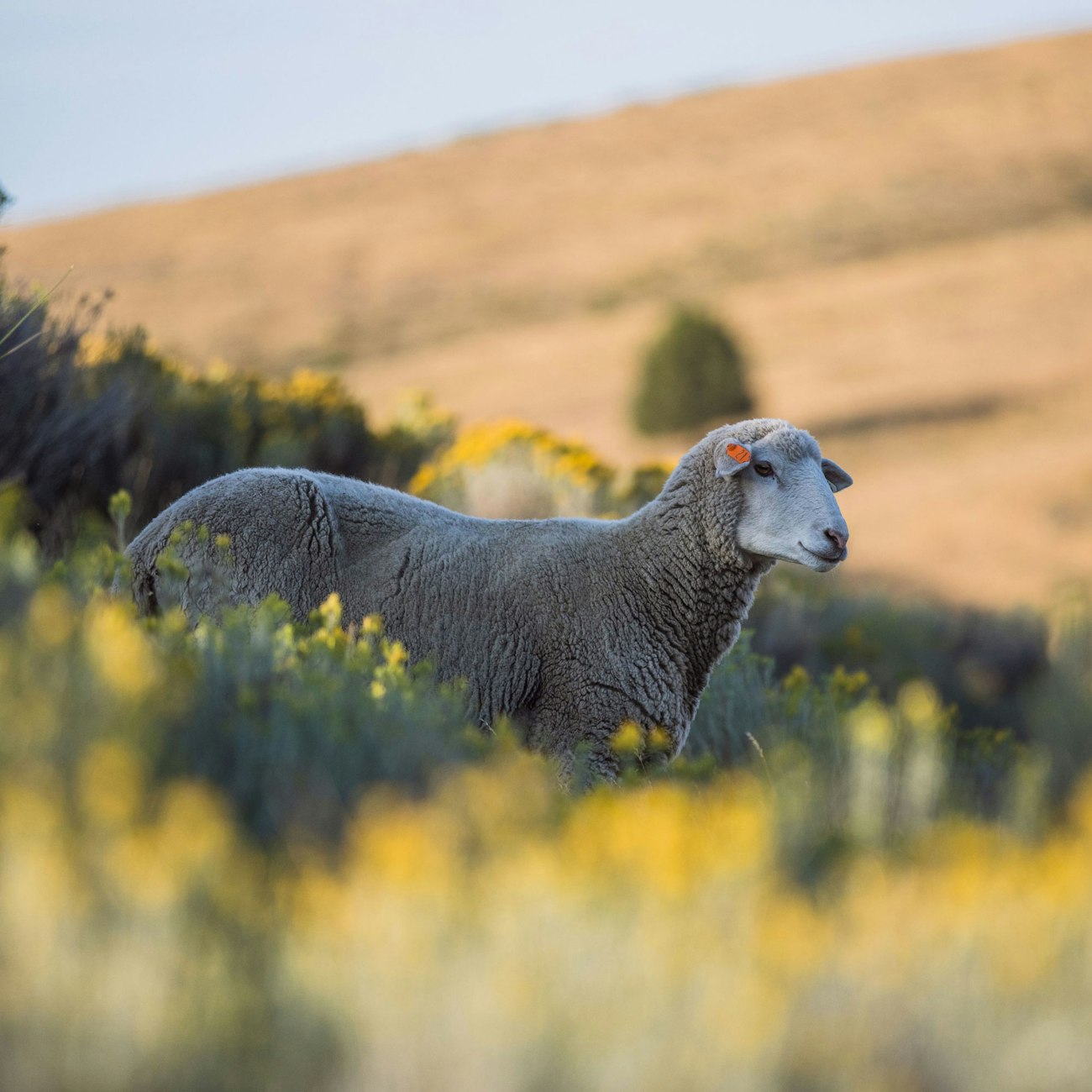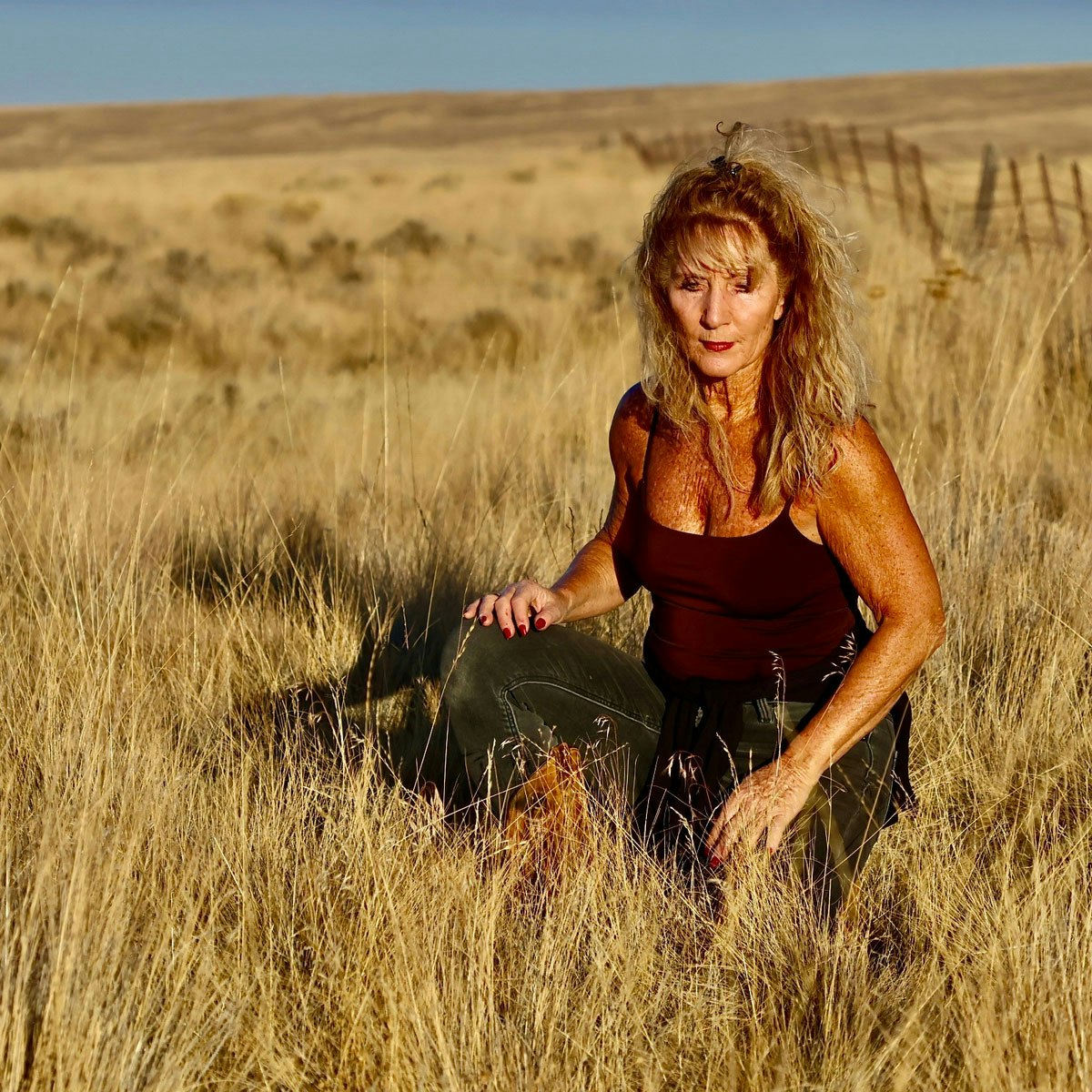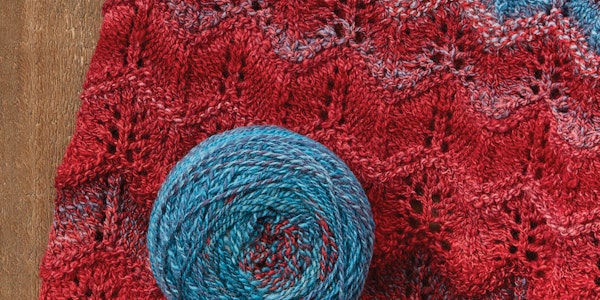It’s not unusual for Jeanne Carver to be juggling several things at once. But on this August morning, the founder of Shaniko Wool Company is negotiating her phone, one shoulder hooked up to a post-surgical ice machine, discussing the intricacies of the Responsible Wool Standard—and why knitters should care.
Wool geeks and fashion buyers might already be familiar with the Textile Exchange’s standards, which include certifications for recycled and organic materials as well as for down, wool, alpaca, and mohair. Unlike vague marketing terms such as eco-friendly, sustainable, or green, these standards give brands and their customers peace of mind, knowing that the garments, home goods, and craft yarn they buy have been third-party audited for animal, land, and worker welfare.
 To receive RWS certification, Imperial Stock Ranch and the ranches joining Shaniko Wool Company demonstrated the welfare of not only the animals and the natural environment of their ranches but also their workers. Photo courtesy of Shaniko Wool Company
To receive RWS certification, Imperial Stock Ranch and the ranches joining Shaniko Wool Company demonstrated the welfare of not only the animals and the natural environment of their ranches but also their workers. Photo courtesy of Shaniko Wool Company
Beginning the Responsible Wool Journey
In 2017, the Carver family’s Imperial Stock Ranch near the ghost town of Shaniko, Oregon, having served first as a Responsible Wool Standard (RWS) pilot site, became the first RWS-certified ranch in the world, heralding a seismic shift in global wool sourcing. Embraced by brands such as the COS, Patagonia, Madewell, Everlane, and Stella McCartney, among others, retailers are seeking to distance themselves from claims of animal cruelty and other crimes against people and the planet. As of the most recent reporting in 2021, 756 farms worldwide had been RWS-certified, the vast majority in South Africa, South America and New Zealand.
Though Jeanne sometimes describes herself as a simple ranch wife, she holds an advanced degree in biomechanics. She and her late husband, Dan, ran Imperial Stock Ranch according to the regenerative agriculture practices he adopted decades ago. She is a keen observer of sheep and wool industry trends, and she has the uncanny ability to put her finger to the wind and create bellwether businesses based on her findings.
It’s not unusual for Jeanne Carver to be juggling several things at once. But on this August morning, the founder of Shaniko Wool Company is negotiating her phone, one shoulder hooked up to a post-surgical ice machine, discussing the intricacies of the Responsible Wool Standard—and why knitters should care.
Wool geeks and fashion buyers might already be familiar with the Textile Exchange’s standards, which include certifications for recycled and organic materials as well as for down, wool, alpaca, and mohair. Unlike vague marketing terms such as eco-friendly, sustainable, or green, these standards give brands and their customers peace of mind, knowing that the garments, home goods, and craft yarn they buy have been third-party audited for animal, land, and worker welfare.
 To receive RWS certification, Imperial Stock Ranch and the ranches joining Shaniko Wool Company demonstrated the welfare of not only the animals and the natural environment of their ranches but also their workers. Photo courtesy of Shaniko Wool Company
To receive RWS certification, Imperial Stock Ranch and the ranches joining Shaniko Wool Company demonstrated the welfare of not only the animals and the natural environment of their ranches but also their workers. Photo courtesy of Shaniko Wool Company
Beginning the Responsible Wool Journey
In 2017, the Carver family’s Imperial Stock Ranch near the ghost town of Shaniko, Oregon, having served first as a Responsible Wool Standard (RWS) pilot site, became the first RWS-certified ranch in the world, heralding a seismic shift in global wool sourcing. Embraced by brands such as the COS, Patagonia, Madewell, Everlane, and Stella McCartney, among others, retailers are seeking to distance themselves from claims of animal cruelty and other crimes against people and the planet. As of the most recent reporting in 2021, 756 farms worldwide had been RWS-certified, the vast majority in South Africa, South America and New Zealand.
Though Jeanne sometimes describes herself as a simple ranch wife, she holds an advanced degree in biomechanics. She and her late husband, Dan, ran Imperial Stock Ranch according to the regenerative agriculture practices he adopted decades ago. She is a keen observer of sheep and wool industry trends, and she has the uncanny ability to put her finger to the wind and create bellwether businesses based on her findings. [PAYWALL]
The first was a range of ranch-grown industrial, apparel, and hand-knitting yarns that famously warmed the backs of U.S. athletes in Ralph Lauren-designed uniforms at the 2014 Winter Olympics. Jeanne started that business in 1999, when globalization had all but scuttled the domestic commodity wool market.
More recently, she founded Shaniko Wool Company, a farm group that provides RWS-certified wool to manufacturers and brands, including uniforms for U.S. Olympians in 2022. The Shaniko Wool group remains the only RWS-certified wool in the U.S., making the Carvers’ decision seem prescient, given the standard’s adoption elsewhere.
The yarn business that had supplied wool to companies such as Ralph Lauren, J. Crew, Room and Board, among others, is now gone, sold because Jeanne wanted time to care for Dan in his final illness. (Dan passed away in 2021, but his vision of stewardship of Imperial Stock Ranch’s resources continues to guide their practices.) But brands kept calling, wanting traceable, sustainable fiber. When Patagonia, which was involved in the RWS-certification charge in the mid-2010s, phoned asking whether the Carvers would be willing to go through the RWS auditing process, the couple agreed. “We have to meet the direction the industry is going,” she said.
 Although the goals of Shaniko Wool Company are national and even global in scope, Jeanne Carver’s work is grounded in appreciation for the sheep who graze her ranch. Photo courtesy of Imperial Stock Ranch and Shaniko Wool Company
Although the goals of Shaniko Wool Company are national and even global in scope, Jeanne Carver’s work is grounded in appreciation for the sheep who graze her ranch. Photo courtesy of Imperial Stock Ranch and Shaniko Wool Company
Reviving American Wool
The U.S. sheep and wool market began to decline following World War II, when American servicemen returned hating mutton because of canned war rations. Compounding the trend were the synthetic textile revolution, changing preferences for white meat, and the demise of the Wool Act in 1996, which eliminated government incentives. The Carvers wanted to put American fine wool in the best light. If brands wanted traceable, authenticated wool, why not make it American?
Dan had been running Imperial Stock Ranch under a conservation management plan since the late 1980s. Rotational grazing, developing off-stream watering catchments, and lowering farm inputs and fuel use with no-till plantings has brought spawning salmon back to the ranch in record numbers, improving both soil quality and profits. To meet RWS standards was mostly a matter of paperwork.
But RWS certification was just the beginning. Jeanne was not only a believer in priming the country’s remaining wool processing engine with grown-in-the-USA fiber, she knew that creating wool products entirely in the U.S. also meant stitching up the rents in the supply chains from washing to wearing.
This meant jobs on American soil and the ability to trace fiber from the farm to fully fashioned product. It also meant the chance to show the world—and U.S. brands—that American wool isn’t just rough and ready, it’s fine enough and well-managed enough to compete anywhere including the U.S., which imports most of its wool and sends the bulk of its wool clip overseas.
“As we’ve increased population and become industrialized, we’ve broken down our regional models of clothing and feeding ourselves,” Carver said. “Because we’re disconnected from that regional mode, we’re not motivated to be stewards; we consume and waste in general. What we’ve been doing is connecting people to the source of their fiber and the importance of this work.”
Her agenda is far-reaching. Having worked at Dan’s side to steward their land and traveled widely, she knows the role heritage ranches play in preserving open space and critical ecosystems and even sequestering carbon. (According to soil samples collected by a team from Oregon State University, Imperial Stock Ranch captures thousands of tons of carbon every year, far exceeding what the operation emits.) Grass needs biting to thrive, and soil regenerates when animals walk across the landscape, adding nutrients and disturbing the soil in ways that render it more amenable to rain.
That she is accustomed to seeing bands of sheep sweep across the land, like clouds moving across the sky, has informed her desire to keep sheep on the land. She is unabashed in her affection for the ungulates and the food and fiber they produce, and for the lifestyle that allows people like the Carvers to put food on plates and fiber on backs.
The Responsible Wool Movement Grows
In 2018, Jeanne started Shaniko Wool Company, aggregating wool from other Western growers under her RWS certification. This meant each producer had to meet all 270 RWS criteria, with internal audits by Jeanne and annual third-party audits. Shaniko covers all certification costs and purchases wool at a premium. The goal: To scale the American RWS-certified wool supply.
Today, the Shaniko Wool brand represents fiber from 10 family ranches who graze sheep on more than 2.6 million acres of private and public land that produce 500,000 pounds of merino and merino-cross fiber annually. This is high-quality, sumptuous fiber with micron counts ranging from 16 to 25 microns, with much of the wool measuring 19 microns—a level of softness that would thrill most crafters.
Securing an RWS label for an end product such as a pair of socks or ball of yarn requires RWS certification across the supply chain. So Jeanne began connecting the dots, starting by bringing three wool warehouses into the fold under her certification and convincing the country’s only scouring-and-combing plant, Chargeurs USA in Jamestown, South Carolina, to certify its plant. She consulted with U.S. mills as well as weaving and knitting companies, which pursued certification for their operations as well. To date, Jeanne estimated, there are at least seven domestic, RWS-certified manufacturing partners and spinning mills, linking the RWS supply chain from farm to yarn and beyond.
To streamline the supply chain even further, in 2022 Jeanne and Chargeurs entered into a licensing agreement, in which Chargeurs, the only wool top-making facility in the U.S., would purchase and sell Shaniko Wool fiber. This allows manufacturers to buy scoured and combed wool directly from them. Based in France, Chargeurs had developed its own third-party certification standard called Nativa, which aligns with RWS standards for land, animal welfare, and human rights, and uses blockchain technology for traceability.
Shaniko Wool is now double certified under both the RWS and Nativa Regen protocols. Jeanne won the 2023 American Sheep Industry’s Innovation Award. The 2022 U.S. Olympic team wore Ralph Lauren-designed Shaniko Wool uniforms. And American RWS products are finally rolling out, making it possible for consumers to purchase grown-and-manufactured-in-the-U.S.A. goods with the RWS imprimatur.
 The ranching practices that Jeanne Carver and her husband Dan have practiced for decades have improved the health of their land and water and even capture carbon in the soil, documented by third-party auditing. Photo courtesy of Shaniko Wool Company
The ranching practices that Jeanne Carver and her husband Dan have practiced for decades have improved the health of their land and water and even capture carbon in the soil, documented by third-party auditing. Photo courtesy of Shaniko Wool Company
A ranch wife meets the king. Maybe.
About a week after the conversation involving the ice machine, Jeanne returns another call to answer a supply chain question, this time from the San Francisco airport, having just spoken about RWS certification and carbon offsets at a sheep industry event. She’s now about 10 days out from rotator cuff surgery, having injured her shoulder during lambing season, and feels lousy, but nonetheless traveled to spread the word about what RWS certification can mean for growers.
Multitasking is what ranchers do, she might say. Much of what she has accomplished with Shaniko Wool transpired while she was caring—and grieving—for Dan. Shaniko Wool is starting to make its way in the market. In November, she’s scheduled to don a couture dress by New York designer Mimi Prober, made from Shaniko Wool for an event in England to celebrate the publication of His Majesty at 75: The Leadership and Vision of King Charles III, a book that celebrates his life and sustainable brands, including Shaniko Wool. She will be interviewed for the event, but doesn’t know whether she will meet the king. But she will be there in an all-American wool dress, ready to talk about a fiber close to the king’s heart but grown across the pond.
“Our story will be there about connecting place to product since 1999,” she said. “And now with Shaniko Wool, I’m bringing other ranches with me.”
Leslie Petrovski is a freelance writer who lives in Denver, Colorado, in a 110-year-old house with her husband, obstreperous dog, and cat. She is an avid knitter, middling crocheter, and lousy spinner, who adores stories about U.S. fiber.
 To receive RWS certification, Imperial Stock Ranch and the ranches joining Shaniko Wool Company demonstrated the welfare of not only the animals and the natural environment of their ranches but also their workers. Photo courtesy of Shaniko Wool Company
To receive RWS certification, Imperial Stock Ranch and the ranches joining Shaniko Wool Company demonstrated the welfare of not only the animals and the natural environment of their ranches but also their workers. Photo courtesy of Shaniko Wool Company


 Although the goals of Shaniko Wool Company are national and even global in scope, Jeanne Carver’s work is grounded in appreciation for the sheep who graze her ranch. Photo courtesy of Imperial Stock Ranch and Shaniko Wool Company
Although the goals of Shaniko Wool Company are national and even global in scope, Jeanne Carver’s work is grounded in appreciation for the sheep who graze her ranch. Photo courtesy of Imperial Stock Ranch and Shaniko Wool Company The ranching practices that Jeanne Carver and her husband Dan have practiced for decades have improved the health of their land and water and even capture carbon in the soil, documented by third-party auditing. Photo courtesy of Shaniko Wool Company
The ranching practices that Jeanne Carver and her husband Dan have practiced for decades have improved the health of their land and water and even capture carbon in the soil, documented by third-party auditing. Photo courtesy of Shaniko Wool Company